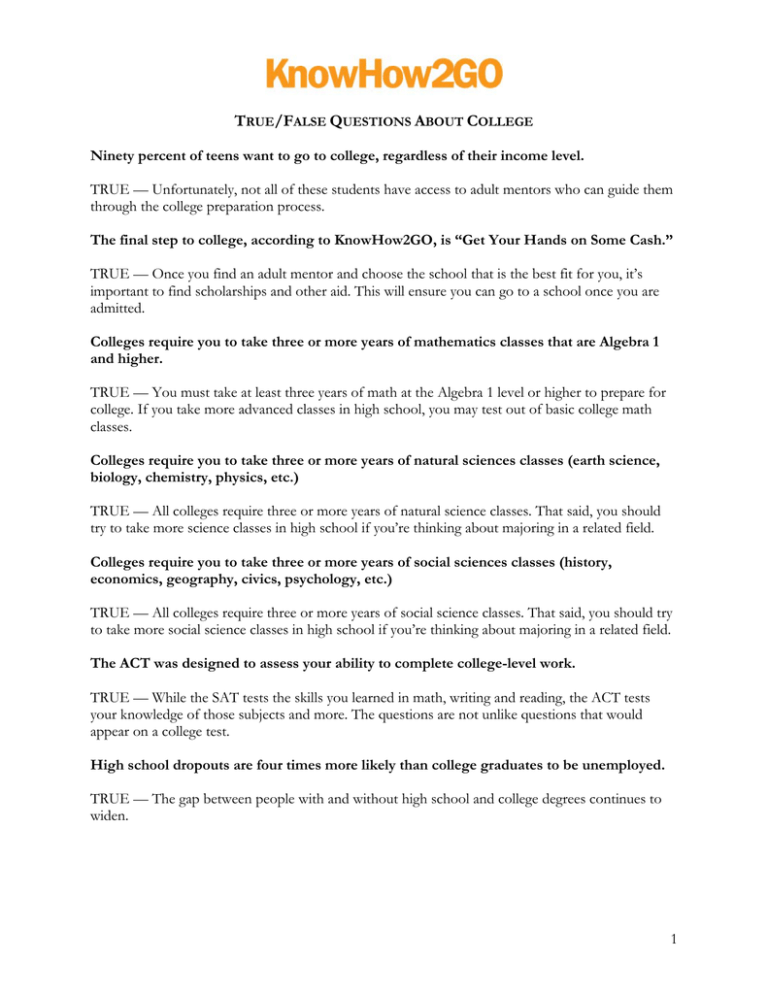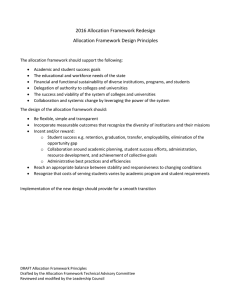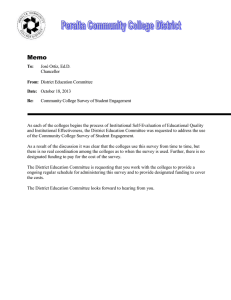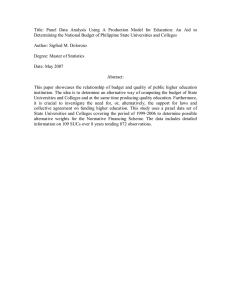true/false questions about college
advertisement

TRUE/FALSE QUESTIONS ABOUT COLLEGE Ninety percent of teens want to go to college, regardless of their income level. TRUE — Unfortunately, not all of these students have access to adult mentors who can guide them through the college preparation process. The final step to college, according to KnowHow2GO, is “Get Your Hands on Some Cash.” TRUE — Once you find an adult mentor and choose the school that is the best fit for you, it’s important to find scholarships and other aid. This will ensure you can go to a school once you are admitted. Colleges require you to take three or more years of mathematics classes that are Algebra 1 and higher. TRUE — You must take at least three years of math at the Algebra 1 level or higher to prepare for college. If you take more advanced classes in high school, you may test out of basic college math classes. Colleges require you to take three or more years of natural sciences classes (earth science, biology, chemistry, physics, etc.) TRUE — All colleges require three or more years of natural science classes. That said, you should try to take more science classes in high school if you’re thinking about majoring in a related field. Colleges require you to take three or more years of social sciences classes (history, economics, geography, civics, psychology, etc.) TRUE — All colleges require three or more years of social science classes. That said, you should try to take more social science classes in high school if you’re thinking about majoring in a related field. The ACT was designed to assess your ability to complete college-level work. TRUE — While the SAT tests the skills you learned in math, writing and reading, the ACT tests your knowledge of those subjects and more. The questions are not unlike questions that would appear on a college test. High school dropouts are four times more likely than college graduates to be unemployed. TRUE — The gap between people with and without high school and college degrees continues to widen. 1 It’s better to take challenging courses than get good grades. TRUE — When you have even some success in advanced or accelerated courses, it indicates to a college that you can handle challenging courses — like those you will find in college. Your high school grades are more important than your standardized test (ACT, PSAT, & SAT) scores. TRUE — Colleges know that your performance in high school is a better predictor of college success than the standardized tests. That does not mean that most colleges will ignore your test scores. You don’t need to decide on a major before you can choose a college. TRUE — College is your time to explore. In most cases, you can choose a major in your sophomore year and still complete your degree in four years. You can get into a selective college if you did poorly in ninth or tenth grade. TRUE — Colleges look for improvement in performance as a sign that you can and will do the work. In fact, a vast improvement as a junior and senior indicates to a college that you have settled down. Some of the best colleges out there are ones you’ve never heard of. TRUE — Some of the nation’s finest colleges don’t play big-time athletics. Judge a college on its own merits, not on name recognition. If you apply for a loan, you don’t have to take it. TRUE — Families are not obligated to accept a low-interest loan if it is awarded to them. Even if you are awarded a loan, you can turn it down and try to find money elsewhere. You shouldn’t necessarily go to the most prestigious college you get admitted to. TRUE — Actually, you should go to the college that fits you best. If it happens to be prestigious, that’s fine. The best time to visit colleges is before you have been admitted. TRUE — Many students find that none of the colleges to which they are admitted feel right when they visit. If possible, visit before you apply and again after you have been admitted. Liberal arts colleges often have great science and math programs. TRUE — The term “liberal arts” is a shortened version of the full title liberal arts and sciences. Most liberal arts colleges have been emphasizing science for all students for a century or more. 2 Colleges are concerned with more than your intellectual and academic development. TRUE — Many colleges and smaller universities pride themselves on their ability to “develop the whole person.” You don’t have to be one of the best students to receive financial aid from colleges. TRUE — If you are admitted and have financial need, colleges generally want to make it possible for you to attend. In fact, the greatest proportion of financial assistance at private colleges tends to go to students in the middle of the class. Colleges want to help students get financial aid. TRUE — The job of a college’s financial aid officer is to make it possible for all admitted students to attend the college while staying within the federal guidelines. If you parents saved for college, you can still qualify for aid. TRUE — Saving for college is almost always a good idea. Since a lot of financial aid comes in the form of loans, the aid you are likely to receive will need to be repaid. You should choose a major that will guarantee you’ll earn a lot of money after college. FALSE — Even if you earn a lot of money, you probably won’t last long in an industry you’re not interested in. Think seriously about what you favorite subjects are and what you do in your spare time, and then pick a related major. Parents are always the best people to talk to about preparing for college. FALSE — If your parents didn’t go to college, chances are there’s an adult in your life who did — and who would be happy to help you prepare for college. Tell your teachers, school counselors, neighbors, coaches and religious leaders you want to go to college. Then, ask if they can help! There are about 2,500 two- and four-year colleges and universities in the country. FALSE — There are more than 4,000 two- and four-year colleges and universities in the country. With this many options, you’re bound to find a school that fits your needs and personality. About 25% of students aged 10 – 17 are not sure they know how to achieve their goal to go to college. FALSE — This number is higher, at 42%. For this reason, KnowHow2GO tells students the first step to college is to “Be a Pain” and find an adult mentor who can help. 3 The first step to college, according to KnowHow2GO is “Find the Right Fit.” FALSE — KnowHow2GO tells students that the first step is to “Be a Pain” — find an adult mentor who can walk you through the next three steps to college. Colleges require you to take three years of English classes (grammar, composition, literature, etc.) during high school. FALSE — Since reading and writing are so important to success in college, most schools require four or more years of English classes. The SAT is a five-hour test that measures verbal and math reasoning skills used for admission. FALSE — The total testing time is 3 hours and 45 minutes. You have 60 minutes for the writing section, 70 minutes for critical reading and mathematics, and 25 minutes for a variable section. The college with the lowest price will be the most affordable. FALSE — Some of the colleges with a high “sticker price” have raised significant amounts of money for scholarships from their graduates and friends. As a result, they have more money to give to students in the form of scholarships, which reduces the cost. Grades in the spring of your senior year aren’t important if you’ve already been accepted into college. FALSE — Most colleges make statements in their admissions materials that they will look at a senior’s spring grades. If the student’s academic performance has dropped off substantially, colleges have been known to cancel an offer of admission. Anyone can get into a public university, but it’s hard to get into a private college. FALSE — Some public universities are among the most competitive to get into, while other public universities are required to take nearly all applicants. It’s true that some private colleges are very selective, but others take students who wouldn’t be admitted to a home state public university. Colleges never require you to take elective classes to be admitted (foreign language, art, music, computer science, etc.). FALSE — Many colleges require you to take art and music classes in high school. Others require three or more years of a foreign language. Be sure to check the Web sites of colleges you’re interested in as you plan which classes to take in high school. 4 You will have a better chance of getting into law or medical school if you go to a university that offers those graduate programs. FALSE — Very few universities give their students special preference for graduate study, and those that do reserve it for only the very best students. Big colleges are best if you haven’t decided on a major field. FALSE — If you are undecided, the best college is one that has core requirements or distribution requirements that ensure you will explore new areas and fields. A lot of out-of-class activities will make up for poor grades. FALSE — While colleges consider out-of-class activities such as athletics, student government, and music when they review an application, they look at your academic performance first. Large universities have greater diversity. FALSE — This is true if “greater diversity” simply means having greater numbers of African Americans, Hispanic Americans, Asian Americans, Native Americans and international students. Unfortunately, the size and nature of a large university often mean that there is little interaction among those various ethnic and racial groups. The federal government provides most financial aid. FALSE — Government grants comprise only a moderate proportion of the financial aid available. Private colleges supply the largest portion of financial aid, in the form of scholarships. Even if you get financial aid, you will end up with large loans to repay when you graduate. FALSE — To ensure you don’t have too much debt at graduation, most colleges allow you to borrow only a reasonable amount. You won’t get aid if you’re not a straight-A student. FALSE — It’s true that many scholarships reward merit, but the vast majority of federal aid is based on financial need and does not even consider grades. Working while going to school will hurt you academic success. FALSE — Research shows that students who work a moderate amount often do better academically. Securing an on-campus job related to career goals is a good way for you to help pay college costs, get experience and create new ties with the university all at the same time. 5



